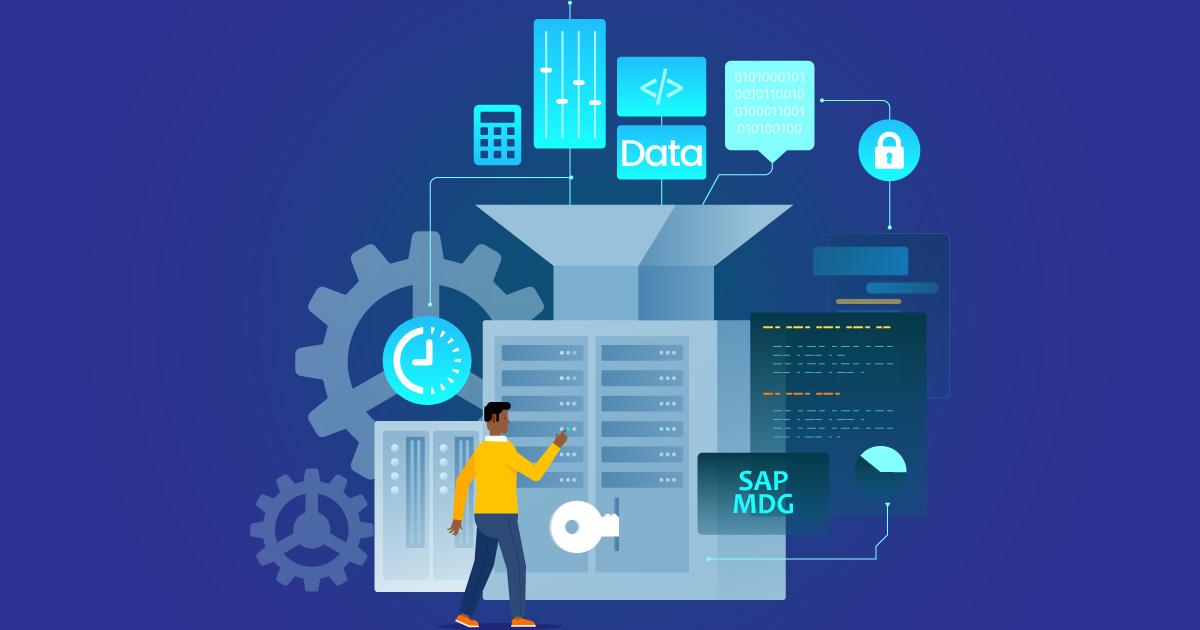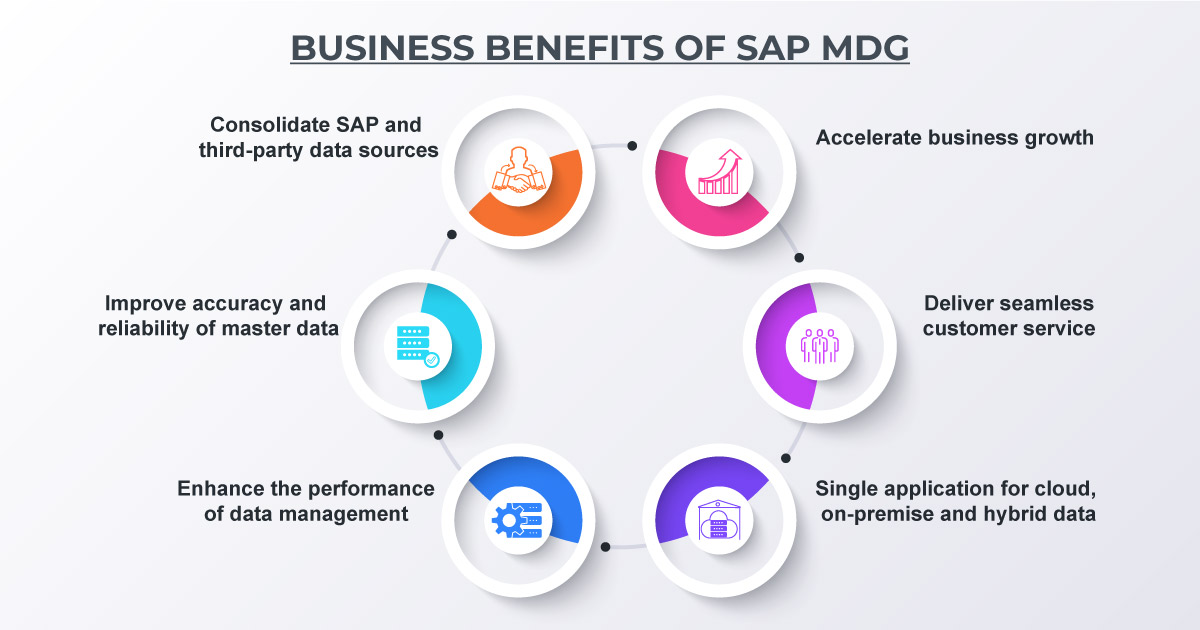Today enterprise data is far-reaching across functions and also plays a crucial role in leading a fast-paced digital transformation strategy. Enterprises must maintain consistent data quality to adhere to regulatory compliance mandates on data security and ensure effective data masking of personal data. With increased privacy regulations and businesses relying on data analytics to help optimize operations and decision-making; a robust data governance solution is a must.
A master data governance application regularises control and management of enterprise data powering advanced and reliable analytics and minimizing the risk of using sub-standard data and enhancing data security. Data governance clearly outlines and documents ownership information of a company’s data, access extended, data sources, and the measures in place which ensure data are secure and compliant with regulations.
The Role of SAP Master Data Governance
SAP Master Data Governance (MDG) is a master data management solution that enables businesses to create, change, and distribute or consolidate master data across the entire business landscape. It supports the central creation, modification, and distribution of master data in a complete system landscape extending quick and trusted access to business data and enabling stakeholders to address digital, analytical, and operational challenges then and there.
Using SAP MDG improves enterprise data management, reduces the total cost of ownership and increases data accuracy. The application simplifies the integration of supplier data residing in both SAP and third-party sources. It cleans, standardizes, detects duplicates, and provides best-record calculations.

Main Features
- SAP Master Data Governance comes in two version. One is SAP Master Data Management on SAP S/4HANA and the other is SAP ERP 6.0 based SAP Master Data Governance
- SAP MDG works effectively with both ERP and S/4HANA and helps address all aspects of data governance requirements thus creating a seamless MDG experience.
- For businesses with working SAP models, the SAP MDG Program can be easily implemented as a separate hub, created on an internal server, or it can be embedded in an existing SAP Box or Hub itself.
- SAP MDG program is ready to use, an out-of-the-box program that includes the most common master data objects such as customers, materials, suppliers, and general financial objects. Asset Objects can be incorporated as a 3rd party solution which includes components such as Equipment Master and Bill of Material, etc. Other master data objects can be built on this platform as well to provide further customization and personalization as per business demands.
- The application combines features that enhance data quality, integrity, workflow, and flexibility for the businesses. Irrespective of the type of data governance model chosen, the SAP MDG program is highly flexible and can work with however the data governance program is implemented across the organization.
- Both standard and custom workflow models for data maintenance can be integrated into the MDG program extending precise control of the entire maintenance process. The application also tracks various workflow models in this process.
Data Quality & SAP MDG
Data quality ensures that master data is fit for the objective businesses start out with and accurately represents the real-world construct of this intent. Data Quality management is a set of practices that focuses on maintaining the highest quality in every aspect of data- right from acquisition to implementation of data processes, through to an effective distribution of data.
Rule management and mining, DQ evaluation, analysis, and remediation are processes utilized in SAP’s MDG program to ensure reliability, accuracy, security, and most of all usability of data. For example- the address validation is carried out using guidelines from USPS which ensures the correct address for customers and vendors. Likewise, extended data validation, data consolidation, mass data processing, extended audit reports, and analytics are measures that help to increase transparency, detail, and disclosure of data.
With more advanced ERP systems such as S/4HANA, it is critical that the data being used is consistent and reliable across functions for these systems to properly function. Gemini Consulting & Services can ensure the integrity of your enterprise data by helping you choose the right technological tools. Contact us to know SAP MDG can streamline your digital transformation efforts.

- Consolidating SAP and third-party data sources create trusted and consistent data- now businesses can effectively process additional bulk updates on large volumes of data with mass processing.
- Improved accuracy and reliability of master data analysis can be carried out Now various teams will own different master data attributes and enable collaborative workflow routing and notification.
- Master data readiness and performance of all data management activities can be monitored with ease. Clear definition, validation, and monitoring to ensure confirmation of established business rules.
- Sales and overall business growth is accelerated as master data stands consolidated and verified across the business regardless of data location or usage of SAP or non-SAP solutions.
- Ability to deliver a seamless customer service and engagement experience – Businesses can quickly arrange and handle service queries, and ensure smooth supplier onboarding using pre-existing data models, rules, workflows, and user interfaces.
- Use a single application available on the cloud, on-premise, or hybrid environment to support master data domains.
Implementing the SAP MDG can help a business evaluate their current ERP practices and challenges that are creating operational friction ultimately affecting customers. SAP’s ERP suite offers an integrated system that can work in tandem with other applications thereby creating a reliable central management system for all business needs.



